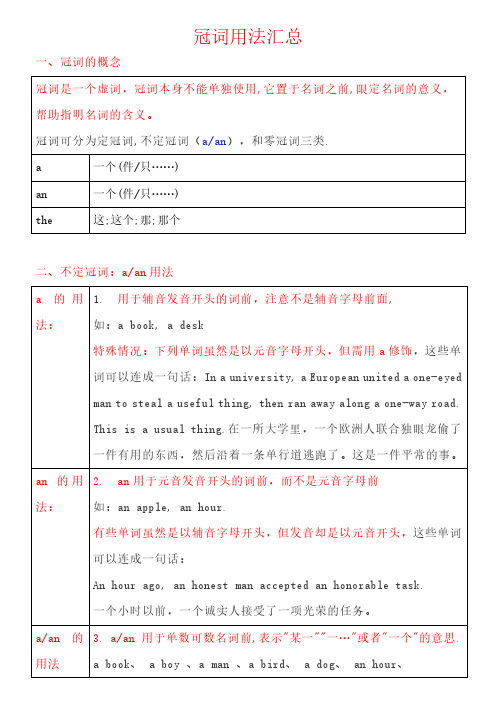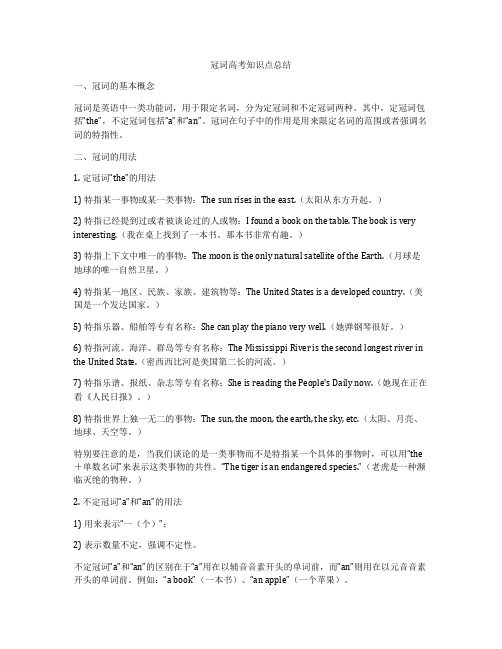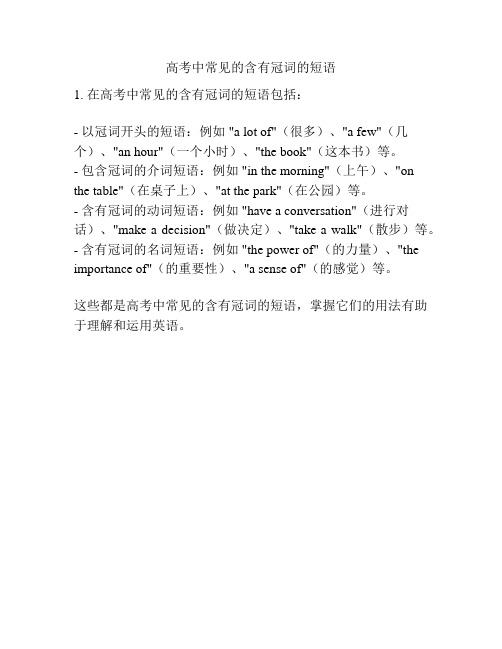冠词固定短语
冠词的用法汇总

冠词用法汇总一、冠词的概念冠词是一个虚词,冠词本身不能单独使用,它置于名词之前,限定名词的意义,帮助指明名词的含义。
冠词可分为定冠词,不定冠词(a/an),和零冠词三类.a 一个(件/只……)an 一个(件/只……)the 这;这个;那;那个二、不定冠词:a/an用法a的用法:1.用于辅音发音开头的词前,注意不是辅音字母前面,如:a book, a desk特殊情况:下列单词虽然是以元音字母开头,但需用a修饰,这些单词可以连成一句话:In a university, a European united a one-eyed man to steal a useful thing, then ran away along a one-way road. This is a usual thing.在一所大学里,一个欧洲人联合独眼龙偷了一件有用的东西,然后沿着一条单行道逃跑了。
这是一件平常的事。
an的用法:2. an用于元音发音开头的词前,而不是元音字母前如:an apple, an hour.有些单词虽然是以辅音字母开头,但发音却是以元音开头,这些单词可以连成一句话:An hour ago, an honest man accepted an honorable task.一个小时以前,一个诚实人接受了一项光荣的任务。
a/an的用法3. a/an 用于单数可数名词前,表示"某一""一…"或者"一个"的意思.a book、 a boy 、a man 、a bird、 a dog、 an hour、an interesting book 、a big dog 、a dangerous animal4.表示类别:这种用法是指某人或某物属于某一种类,或者指某一种类的人或物中的任何一个或一件,或者指某一种类的人或物,但不具体说明是何人或何物。
意为one;例如:表示“一个”,意为one;指某人或某物。
常用固定短语(一)冠词短语之欧阳数创编

常用固定短语(一)冠词短语不定冠词--固定短语Have a look 看一看Have a walk 散步=Take a walk Have a break 休息一下=Take a break Have a try 试一试Have a bath 洗澡=Take a bath Have a go at= give ...a shot 皆是口语,有略同意思,通常可以互换:不妨试一试你的身手I think you cando it. Give it ashot.Have a go at it.I'm sure you cando it.Have a swim 游泳Have a word with和…说句话Take a rest 休息Take a walk 散步=Have a walkTake a break 休息一会=Have a breakTake a bath洗澡=Have a bathMake a choice 作出选择Make a decision做决定、下决心Make a plan 制定计划Make a study 研究一下All of a sudden突然Take an interestin 感兴趣In a word 简而言之Get in a word 插话A great many=A good many 许多A number of许多、若干Do a good deed做好事Go for a walk 出去散步As a matter of fact 事实上Pay a visit to 参观In a hurry 匆忙的As a result of 由于、因为Once upon a time 从前Once in a while 偶尔、不时After a while 不久、过一会Have a word with 和…说句话One at a time 一次一个Be a waste of 浪费At a loss 不知所措In a sense在某种意义上Lend a hand 帮助As a rule照例Dream a sweetdream做一个甜梦Smile anattractivesmile笑的迷人Fight a hardfight进行艰苦的斗争Die a gloriousdeath光荣牺牲Sleep a soundsleep 睡的很香Live a happylife过着幸福生活定冠词--固定短语On the otherhand 另一方面For the timebeing 暂时At the beginningof 在…开始时Make the bed 整理床铺At the end of在…结尾时At the foot of在…脚下Keep the peace维护和平At the moment 此时At the back of在…后面Strike the eye引人注目At the same time 同时By the way 顺便提及Burn the night oil 开夜车Put the blame on 归咎于On the other side of 在…另一边On the contrary 相反On the spot 当场On the air 在广播On the increase 不断增加On the farm 在农场On the radio 通过无线电Take the placeof 代替、接替By the end of到…时为止The other day 几天前Break the ice 打破沉默In the middle of在…中间In the open 在露天In the dark 在暗中In the form of以…形式Fall in thehabit of 养成…的习惯With theexception of除…外The day beforeyesterday 前天In the whole 总之Step by step 逐步地Shoulder toshoulder 肩并肩Week by week 一周一周From time totime 有时From morningtill night 从早到晚Nose to tail 紧跟后面Day and night 日夜/整天Little by little渐渐Side by side 并排、并肩Heart and soul 全心全意Arm in arm 臂挽臂Hour after hour 连续地From door to door 挨家挨户地From north to south 从北到南零冠词固定词组At dawn//dC:n拂晓Daybreak 黎明Sunset 日落、晚年Dusk 黄昏(Dark 黑暗)In danger 垂危In debt 欠债On horseback 马背上On foot 走路Be in bed 卧床Be at church 做礼拜Be at classBe at schoolBe at hospitalLeave word 留言Go to town 进城购物Go to classGo to collegeGo to schoolGo to university上大学In jail坐牢Leave college大学毕业At table 就餐By heart 熟记、默记Beyond hope 毫无希望Beyond在远处,在较远的一边In honour of 为纪念、为庆祝In short 总之On sale 待售Out of stock脱销Undar way 进行中On arrival 到达By chance 偶然、意外地By accident 偶然Take heart 振作、鼓起勇气Loss heart 失去信心Out of place不恰当的、不合适的Make use of 利用On second thoughts经深思熟虑后By means of 通过Come into power 上台Put…into practice 付诸实践Do damage to 给…造成伤害In modern times 当代Send word捎话In use 使用Take medicine服药In search of 寻找Make room for 为…腾出空间Word camethat …消息传来一冠只差意差千里In case of以防In the case of在..的情况/就..来说In front of 在..的正前面In the front of在..里面的前部In hospital 住院In the hospital在那所医院(住院/工作)In charge of 负责、管理In the charge of由..负责、由..管理In prison 坐牢In the prison 在那所监狱In bed 卧床In the bed 在床上In class 在上课In the class 在这个班里In office 执政In the office 在办公室里In future 从今以后In the future将来某时In sight(of)看见In the sight of在..看来In secret秘密地、私下In the secret 参与秘密、知道内情By day 在白天By the day 按天计算At table 在吃饭At the table 在桌旁Go to sea当水手=become a sailor Go to the sea 到海边去Go to college 上大学Go to the college 到大学去Go to church 做礼拜Go to the church 去教堂Go to bed 睡觉Go to the bed 去床边Go to court 起诉、朝见君王Go to the court去法院Go to town进城(买东西)Go to the town到城里去Go to prison 入狱Go to the prison去监狱Live on farm务农Live on the farm住在农场Leave school 辍学Leave the school离校On board 坐船(车)On the boards当演员On earth究竟、在世上On the earth 在地球上Out of question毫无疑问Out of thequestion 不可能的On land 在陆地上On the land 在土地上Take place 发生、举行Take the placeof 代替、取代Two of us 我们当中其中两人The two of us就我们两人In fashion 流行、时髦In the fashion 赶时髦、随大流In force 有效的、在实施中In the force 在军队服役In place of 代替In the place of 在..位置上In possession of 占有、拥有持有In the possession of 被..占有/掌管On fire 着火、发怒On the fire在火炉上、在审议中On occasion(s)有事On the occasion of 借..之际/趁..机会On watch 值班On the watch 留神、密切注视。
冠词的用法及其特殊情况

冠词的用法及其特殊情况冠词是英语中一类非常重要的词汇,在句子中起到限定名词的作用。
冠词分为定冠词(the)和不定冠词(a/an)。
本文将重点讨论冠词的用法,并探讨一些特殊情况下的冠词用法。
一、定冠词的用法定冠词“the”用于特指一个或多个已知的人或物。
其用法如下:1. 特指特定的人或物:the book(那本书),the dog(那条狗)。
2. 特指独一无二的事物:the sun(太阳),the moon(月亮)。
3. 特指某类人或物的整体:the rich(富人们),the poor(穷人们)。
4. 特指前文中提到过的人或物:I saw a dog. The dog was white.(我看到了一只狗。
那只狗是白色的。
)二、不定冠词的用法不定冠词“a/an”用于泛指一个人或物。
其用法如下:1. 泛指单数名词:a book(一本书),an apple(一个苹果)。
2. 泛指某类人或物:A cat is a mammal.(猫是哺乳动物。
)3. 泛指某个成员:He's an engineer.(他是一名工程师。
)三、特殊情况下的冠词用法1. 用于专有名词:the Great Wall(长城),the United States(美国)。
2. 用于地理名称:the Pacific Ocean(太平洋),the Alps(阿尔卑斯山)。
3. 用于乐器名称:He can play the piano.(他会弹钢琴。
)4. 用于某些固定短语中:in the morning(早上),at the moment(此刻)。
特殊情况下的冠词用法需要我们具体的语境来判断,建议在学习过程中多读多练,熟悉习惯用法。
四、常见错误用法1. 不必要使用冠词:I love playing basketball(我喜欢打篮球)。
2. 不应使用冠词:She is teacher(她是老师)。
3. 缺少冠词:He wants to be doctor(他想当医生)。
英语语法冠词

例:Mr Li, the tutor was no better a schoolar than many a nine –form boy.
表示特指的人或事物。如:The man with a flower in his hand is Jack..(手上拿着一朵花的男人是杰克)
复述前面提到过的人或事物。如:There is a man under the tree. The man is called Robert.(树下有个人, 那个人叫罗伯特。)
02
表示某类人或事物,以区别于其他种类。如:An elephant is much stronger than a man.(大象比人强壮多了。)(不能译为:一头大象比一个人强壮。)
03
1、不定冠词a / an的用法:
(3).表示“一个……另一个…”之意时用 one 而不用a 例:One man’s meat is another man’s poision人各有志。 另:在下列情况下,a,one可以互换: 例:in a/one word简而言之,a/one hundred percent百分之百,十足 (4).用在单数名词前,相当于某一个或某一位,抑或用在物质名词或抽象名词表“一阵”,“一份”等或表抽象名词具体化。 例:a. A Mr Li called you tonight,(某一位) b.Unfortunately , only the poor boy was caught in a heavy rain (表一阵) c.Through their efforts , their experiment was quite a great success.(抽象名词具体化) (5) a/an可表“每一”之意 例:I go there once a week to ensure that everything is ok.(每一周)
常用固定短语(一)冠词短语

常常使用固定短语(一)冠词短语之袁州冬雪创作不定冠词--固定短语Have a look 看一看Have a walk 散步=Take a walkHave a break 休息一下=Take a breakHave a try 试一试Have a bath 洗澡=Take a bathHave a go at= give ...a shot皆是白话,有略同意思,通常可以互换:无妨试一试你的身手I think you can do it. Give it a shot.Have a go at it. I'm sure you can do it. Have a swim 游泳Have a word with和…说句话Take a rest 休息Take a walk 散步=Have a walkTake a break 休息一会=Have a breakTake a bath洗澡=Have a bathMake a choice 作出选择Make a decision 做决议、下决计Make a plan制定计划Make a study 研究一下All of a sudden 突然Take an interest in感兴趣In a word 简而言之Get in a word 插话A great many=A good many 许多A number of许多、若干Do a good deed做好事Go for a walk 出去散步As a matter of fact 事实上Pay a visit to 观赏In a hurry 匆忙的As a result of 由于、因为Once upon a time 从前Once in a while 偶尔、不时After a while 不久、过一会Have a word with和…说句话One at a time 一次一个Be a waste of 华侈At a loss 手足无措In a sense在某种意义上Lend a hand 帮忙As a rule照例Dream a sweet dream做一个甜梦Smile an attractive smile笑的诱人Fight a hard fight停止艰苦的斗争Die a glorious death 光荣牺牲Sleep a sound sleep 睡的很香Live a happy life过着幸福生活定冠词--固定短语On the other hand 另外一方面For the time being 暂时At the beginning of 在…开端时Make the bed 整理床铺At the end of 在…开头时At the foot of 在…脚下Keep the peace维护和平At the moment 此时At the back of 在…后面Strike the eye 引人注目At the same time 同时By the way 顺便提及Burn the night oil 开夜车Put the blame on 归咎于On the other side of在…另外一边On the contrary 相反On the spot 当场On the air 在广播On the increase 不竭增加On the farm 在农场On the radio 通过无线电Take the place of 代替、代替By the end of 到…时为止The other day 几天前Break the ice 打破沉默In the middle of 在…中间In the open 在露天In the dark 在黑暗In the form of 以…形式Fall in the habit of养成…的习惯With the exception of除…外The day beforeyesterday 前天In the whole 总之Step by step 逐步地Shoulder to shoulder肩并肩Week by week 一周一周From time to time 有时From morning tillnight 从早到晚Nose to tail 紧跟后面Day and night 日夜/整天Little by little 渐渐Side by side 并排、并肩Heart and soul 全心全意Arm in arm 臂挽臂Hour after hour持续地From door to door 挨家挨户地From north to south 从北到南零冠词固定词组At dawn//dC:n拂晓Daybreak 拂晓Sunset 日落、晚年Dusk 黄昏(Dark 黑暗)In danger 垂危In debt 欠债On horseback 马背上On foot 走路Be in bed 卧床Be at church 做星期Be at classBe at schoolBe at hospitalLeave word 留言Go to town 进城购物Go to classGo to collegeGo to schoolGo to university 上大学In jail坐牢Leave college 大学毕业At table 就餐By heart 熟记、默记Beyond hope 毫无希望Beyond在远处,在较远的一边In honour of 为纪念、为庆祝In short 总之On sale 待售Out of stock脱销Undar way 停止中On arrival 到达By chance 偶尔、意外地By accident 偶尔Take heart 振作、鼓起勇气Loss heart 失去信心Out of place不恰当的、分歧适的Make use of 操纵On second thoughts经深思熟虑后By means of 通过Come into power上台Put…into practice付诸实践Do damage to 给…造成伤害In modern times当代Send word捎话In use 使用Take medicine服药In search of 寻找Make room for为…腾出空间Word ca me that …消息传来一冠只差意差千里In case of以防In the case of 在..的情况/就..来讲In front of 在..的正前面In the front of 在..外面的前部In hospital 住院In the hospital在那所医院(住院/工作)In charge of 负责、管理In the charge of 由..负责、由..管理In prison 坐牢In the prison 在那所监狱In bed 卧床In the bed 在床上In class 在上课In the class 在这个班里In office 执政In the office 在办公室里In future 从今以后In the future将来某时In sight(of)看见In the sight of 在..看来In secret奥秘地、私下In the secret 参与奥秘、知道内幕By day 在白日By the day 按天计算At table 在吃饭At the table 在桌旁Go to sea当水手=become a sailorGo to the sea 到海边去Go to college 上大学Go to the college 到大学去Go to church 做星期Go to the church 去教堂Go to bed 睡觉Go to the bed 去床边Go to court 起诉、朝见君王Go to the court 去法院Go to town进城(买东西)Go to the town 到城里去Go to prison 入狱Go to the prison 去监狱Live on farm务农Live on the farm住在农场Leave school 辍学Leave the school 离校On board 坐船(车)On the boards当演员On earth毕竟、在世上On the earth 在地球上Out of question 毫无疑问Out of the question 不成能的On land 在海洋上On the land 在土地上Take place 发生、进行Take the place of 代替、取代Two of us 我们当中其中两人The two of us就我们两人In fashion 风行、时髦In the fashion 赶时髦、随大流In force 有效的、在实施中In the force 在部队服役In place of 代替In the place of在..位置上In possession of 占有、拥有持有In the possession of 被..占有/掌管On fire 着火、发怒On the fire在火炉上、在审议中On occasion(s)有事On the occasion of 借..之际/趁..机会On watch 值班On the watch 留心、紧密亲密注视。
冠词高考知识点总结

一、冠词的基本概念冠词是英语中一类功能词,用于限定名词,分为定冠词和不定冠词两种。
其中,定冠词包括“the”,不定冠词包括“a”和“an”。
冠词在句子中的作用是用来限定名词的范围或者强调名词的特指性。
二、冠词的用法1. 定冠词“the”的用法1) 特指某一事物或某一类事物:The sun rises in the east.(太阳从东方升起。
)2) 特指已经提到过或者被谈论过的人或物:I found a book on the table. The book is very interesting.(我在桌上找到了一本书。
那本书非常有趣。
)3) 特指上下文中唯一的事物:The moon is the only natural satellite of the Earth.(月球是地球的唯一自然卫星。
)4) 特指某一地区、民族、家族、建筑物等:The United States is a developed country.(美国是一个发达国家。
)5) 特指乐器、船舶等专有名称:She can play the piano very well.(她弹钢琴很好。
)6) 特指河流、海洋、群岛等专有名称:The Mississippi River is the second longest river in the United State.(密西西比河是美国第二长的河流。
)7) 特指乐谱、报纸、杂志等专有名称:She is reading the People's Daily now.(她现在正在看《人民日报》。
)8) 特指世界上独一无二的事物:The sun, the moon, the earth, the sky, etc.(太阳、月亮、地球、天空等。
)特别要注意的是,当我们谈论的是一类事物而不是特指某一个具体的事物时,可以用“the +单数名词”来表示这类事物的共性。
“The tiger is an endangered species.”(老虎是一种濒临灭绝的物种。
冠词的用法

冠词的用法一.冠词的种类:1. 定冠词: the2. 不定冠词: a / an当紧跟不定冠词之后的单词是辅音发音开头时,不定冠词应该用a, 当紧跟不定冠词之后的单词是元音发音开头时,不定冠词应该用 an.。
a + [辅音……] a wallet, a European countryan + [元音…… ] an hour, an 8-year-old boy一般说来,冠词应放在名词或名词词组的最前面.a matter, an easy problem, a necessary action, the world, the old stone bridge,注意:在以下六种词中,只能使用其中的一种词修饰名词:冠词、指示代词(如:this, that, these, those)、形容词性物主代词(如:my, your, his, her等)名词所有格(如:Tom’s, the Smiths)、不定代词(如:every, each, any)以及疑问代词(如:which, what).1. 我的一位朋友 (不能说: my a friend) a friend of mine 或 one of my friends2.你的这两位老师 (不能说:your the two teachers) the two teachers of yours3.哪一把伞是你的? (不能说:Which an umbrella is yours?) Which umbrella is yours?4. 一辆这种自行车 (不能说:a this kind of bike) a bike of this kind5.每隔几天一次 (不能说:once every a few days) once every few days三.冠词的用法1.a / an 表示数量“一”,但不强调数量“一”.如果强调数量“一”,应该用one.请比较:I have a brother.(想告诉别人: “我”有兄弟,虽然提到了“一个”,但想强调的是“我”不是独生子女,或想强调的是“我”不是有姐妹.)I have only one brother.(想告诉别人: “我”并没有两个、三个兄弟.)2.不表示数量“一”,而是表示类别,可以在单数可数名词前加a /an.A horse runs faster than an elephant.注意:也可以在单数可数名词前加the或在复数可数名词前不加任何冠词表示类别.不可数名词表示类别时不加任何冠词. 例如:The horse runs faster than the elephant.Horses run faster than elephants.One can not live without air or water.3.对于说话者特指但听话者还不知的单数可数名词(人或物),第一次提到时,前面经常加a / an;再次提到才加the,这时,说话者和听话者都知道是特指哪一个人或物.At a science museum in Canada, you can feel your hair stand on end as harmless electricity passes through your body. Last year I was lucky enough to have a chance to visit the museum.I bought a computer 3 years ago, but I have sold the computer (=it) already.4.在形容词、现在分词或过去分词前加the可以表示一类人或物,且表示复数.the poor, the sick, the following, the wounded, the English, the French5.在最高级副词前可以加the,也可以不加the;在最高级形容词前一般要加the; 但是, 如果不表示“最”, 而是表示“非常”, 则应在最高级形容词前加 a / an,She sings (the) most beautifully in our school.Xiamen is the most beautiful city in Fujian Province.Xiamen is a most (=very) beautiful city.6.在序数词前一般要加the表示顺序;但如果表示数量的增加,表示“又一…”,相当于“another”的意思,则要在序数词前加 a / an.This is the second time that I have seen the film.I’ve had two cakes, but I’d like a third (=another) one.7.提到了“演奏”的乐器前和提到了“发明”的物名前要加 the.She often practises playing the piano after supper.(比较:There is a piano near the window of the living room.)---What do you think was the most useful invention in the 20th century?---The cell phone, I think.Who invented the cell phone?(比较:Do you own a telephone?)8.在世界上独一无二的名词和含有普通名词的专有名词前要加the.the world, the moon(比较:Sitting down in front of their computers, they leave a familiar world and enter a place where things act instrange ways.)the United States of America, the Great Wall(比较:America, China, New York)9.在和介词by连用的表示时间、长度、重量的名词前加the, 表示“按……计算”.by the month, by the yard, by the dozen, by the gallon注意:在和介词by连用的weight, length前不加the.例如:These cigarettes are sold by weight.Cloth is often sold by length.10.在姓氏的复数前加the,表示全家人或该夫妇两人.the Whites, the Smiths, the Wangs11.在比较级形容词前加the,可以表示两者中“比较……些的那个……”或“越……, 就越……”.the taller of the two boysthe more expensive of the coatsThe farther away from the earth we are, the thinner the air becomes.12.在表示江河、湖泊、山脉、海洋、群岛、海峡、沙漠等地理名词前加the.the River Nile, the West Lake, the Ural Mountains(the Urals), the Pacific Ocean, the English Channel13.在一些固定词组中要用the.in the morning, in the hope of, with the help of, out of the question (不可能)14.在一些固定词组中要用a / an.have a rest, have a break, take a walk, have a look, in a moment, in a minute, once upon a time, twicea month, four times an hour四.不用冠词的几种情况.1.指球类运动前, 以及在和介词by连用的交通工具与通讯方式前不用冠词.He seldom plays football on Sunday morning.They came to Shanghai by ship (water, plane, air, train).We informed him by telegram that we would arrive early inthe morning.注意:如果交通工具名词或通讯方式名词用了复数形式或前面有了修饰语,就不能使用介词by,而要用in, on.例如: We can go there on bikes.Instead of writing to her mother, she likes talking to her on the telephone.2.在 go to之后加地点名词,表示去从事某项活动,不用冠词;和介词in连用,表示在从事某项活动,也不用冠词.go to school / in school go to hospital / in hospitalgo to class / in class go to bed / in bed注意:在以上词组中如果使用冠词,则表示到某个地点去或在某个地点.例如:I’m going to the hospital to tell Dr. Li something important.---Where is your father?---He is in the school.3.在三餐饭前或在四个季节前不加冠词.Sometimes, she has lunch at school.When autumn comes, leaves turn yellow.注意:如果在三餐饭、四个季节的前面或后面有修饰语,则应加冠词.例如:In the autumn of 1949, our hometown was liberated.In a cold winter, he left his hometown for Shanghai.We had a good supper at her home.4.作表语,同位语,宾语补足语或主语补足语的职务头衔名词前不加冠词.例如:They elected Bush President of the USA.Jack, head of our workshop, didn’t agree with us.Who is chairman of the meeting?5.在表示地名、人名、抽象名词和物质名词前不加冠词;在称呼前也不加冠词.例如:London, Shakespear, importance, sandHi, little friend!Good morning, boys and girls!但以下情况要加冠词.It’s a pleasure.(指一件令人快乐的事情)The water in this well is very dirty. (特指)Our journey by camel was quite an experience. (转义)6.在节假日前不加冠词.例如:Christmas Day, Women’s Day注意:在“春节”和“中秋节”之前要加the. 例如:the Spring Festival, the Mid-autumn Day7.在一些固定词组或固定句型中不用冠词.例如:out of question (不成问题)in time (按时)in turn (轮流)at midnight / at daybreak /at dawn/at sunriseChild as he is, he is very brave.(虽然他是个孩子, 但是他很勇敢.)It is time that we started out.(我们现在该出发了.)8.特别要注意:(1)用定冠词与不定冠词的区别,如:the second student(第二个学生)--a second student(又一个学生);the most interesting book(最有趣的书)--a most interesting book(一本非常有趣的书);the world(世界)--a better world(一个更好的世界);play the piano(弹钢琴)一buy a piano(买一台钢琴)。
高考中常见的含有冠词的短语

高考中常见的含有冠词的短语
1. 在高考中常见的含有冠词的短语包括:
- 以冠词开头的短语:例如 "a lot of"(很多)、"a few"(几个)、"an hour"(一个小时)、"the book"(这本书)等。
- 包含冠词的介词短语:例如 "in the morning"(上午)、"on
the table"(在桌子上)、"at the park"(在公园)等。
- 含有冠词的动词短语:例如 "have a conversation"(进行对话)、"make a decision"(做决定)、"take a walk"(散步)等。
- 含有冠词的名词短语:例如 "the power of"(的力量)、"the importance of"(的重要性)、"a sense of"(的感觉)等。
这些都是高考中常见的含有冠词的短语,掌握它们的用法有助于理解和运用英语。
- 1、下载文档前请自行甄别文档内容的完整性,平台不提供额外的编辑、内容补充、找答案等附加服务。
- 2、"仅部分预览"的文档,不可在线预览部分如存在完整性等问题,可反馈申请退款(可完整预览的文档不适用该条件!)。
- 3、如文档侵犯您的权益,请联系客服反馈,我们会尽快为您处理(人工客服工作时间:9:00-18:30)。
all the same 仍然;all the time 一直;at the moment 此刻;at the same time 同时;by the way 顺便说;do the shopping/washing 买东西/ 洗衣服;in the morning/afternoon/evening 在上午/ 下午/晚上;in the open air在户外,在野外
某些固定词组中不用冠词。
⑴与by连用的交通工具名称前:by bus乘公共汽车;by car乘汽车;by bike骑/坐自行车;by train 乘火车;by air/plane 乘飞机;by sea/ship 乘船,但take a bus, in a boat,on the bike 前需用冠词
(2)名词词组:day and night日日夜夜;brother and sister兄弟姐妹;hour after hour时时刻刻;here and there 至U处
(3)介词词组:at home在家;in surprise惊奇地;at noon在中午;on foot步行;at night在晚上; on duty 值日;at work 在工作;on time 准时;for example 例如;in class在上课;on show 展览;in bed在
床上
(4)go短语:go home回家;go to bed 上床睡觉;go to school去上学;go to work 去上班;
go shopping/swimming/boating/fishing 去买东西/游泳/划船/钓鱼六.用与不用冠词的差异
in hospital 住院/in the hospital 在医院里go to sea 出海/go to the sea 去海边
on earth究竟/on the earth 在地球上,在世上
in front of 在..... (外部的)前面/in the fro nt of 在....... (内部的)前面take place发生
/take the place(of)代替at table 进餐/at the table 在桌子旁by sea 乘船/by the sea 在海边
in future从今以后,将来/in the future 未来
go to school(church …)上学(做礼拜…)/go to the school(church …)到学校(教堂…)去on horseback 骑着马/on the horseback 在马背上
two of us我们当中的两人/the two of us 我们两人(共计两人)out of question 毫无疑问/out of the question 不可能的,办不至U的next year 明年/the next year 第二年
a teacher and writer 一位教师兼作家(一个人)/a teacher and a writer 一位教师和一位作家(两个人)
例:
in the morning 在上午 in the evening 在瞬上in the field 在田野里in the country 在乡间In the sun 往阳光下in the distance 在远处□n tiie right 在右边by the way 顺便说一下in the afternoon 在下午In the night 在夜里in thfi sky 在空中in the dark在暗处in the rain在雨中in the shade在阴凉处on the left 在左边all the tim巳始终in the middle of 在中间
咸词份为不定冠词(6 an ),定录词(the ),和矛录词.
ill.雾冠词的用法,
take place 友生,举行 on eaitli 究丸到底(用干加退语气) take one's p I HCR out of question ouLof
Lhe question 代苜冥人(的工
作)
一走,壬无问題 on the earth 在地球上 four of them 也柏当中4人(不只4人) the four of them 他们4人(共计却人)
neixt week (month)下周(下个月)(以现在看将来)
tiie next weAk (montti)第二周(下个月)(在过去慕一日寸间之后)
例:have目cold患感冒I id ve
a i est 休息、下have a swim 游
3 have a fever 发烧have a quarrel 吵架ha ve a toothache 牙痛have a dancA 跳旌have a talk 谈话go for a walk 散步take a bath 洗澡tell a lie 撒谎wa it a moment 諄一会儿
v/ith a light heart 愉快地
v/it+i a smilp 微笑着with an effort 努力地as a result 因此for a while —会儿once in a while 雋尔tor a moment —会儿have a word with sb.同某人谈话have a try 试一下
have a good dme 玩埒高兴have a look 看一看havp a hpadachp 头痛have a good sleep 好好睡一觅lidve a nice Uip 快
have(/take) a walk 替攵步make a face 做鬼脸in a hurry 匆忙地do sb. a favour 帮某人忙take an active part in 积极参加live a happy life 过幸福生活give a lesson 教一堂陳
at a time 每次as a whole 作为整体all of a sudden 突然once upon a time 从前in a word 总之
in the front of 在前部
in the daytime 曰天
yo Lo the coiiceil去听音乐会at (/in) the beginning 幵舱ar thp momAnt 当时.此刻all th巳year round —年到头go to the cinema 去看电影go Lo thp ttieatr^ 去看戏at the weekend 周末on the way home 回家逑中all the same 依加oil the whole 总之at the same time 同时on thA planp在飞机上in the year 2008 在2008 年the other day 前几天at U IE boLtoin of 在…•底祁in the end 终于
on tfie one hand, on ttie other hand —力面,另一方面。
